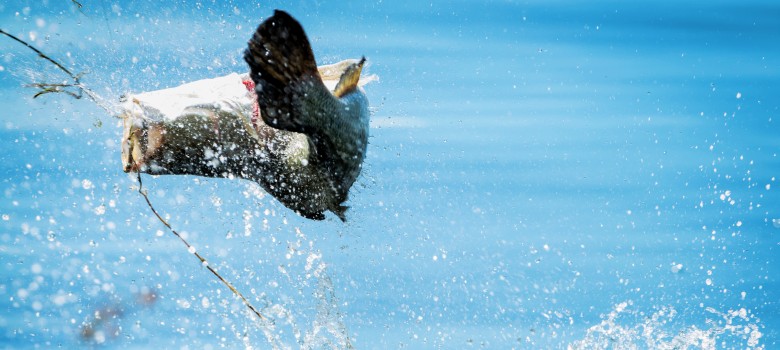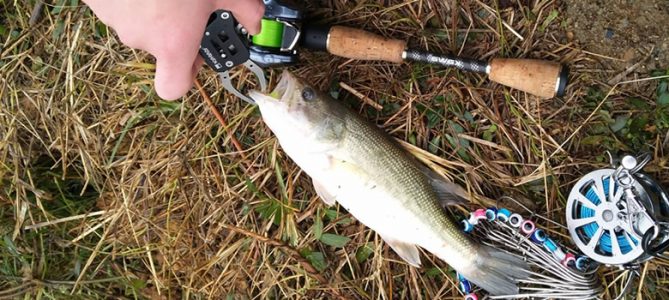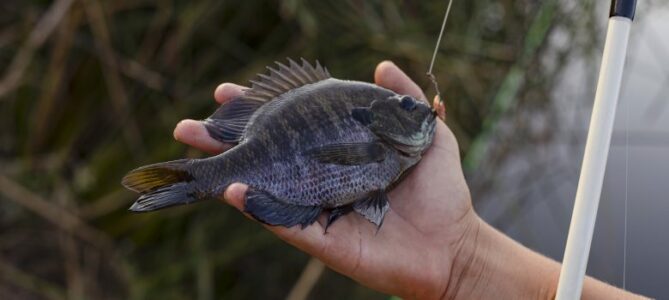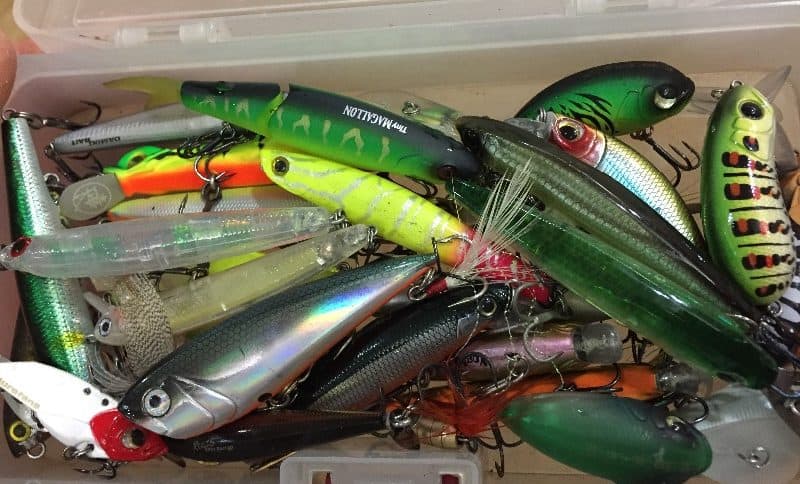If you buy via a link on this page, we may receive a commission, at no extra cost to you.Learn more
Nothing beats the thrill of landing a big bass after a long fight. The satisfaction only increases as the fish gets bigger!
Don’t get me wrong. All bass are precious to me. But I must be honest. Catching a monster leaves you with a sense of fullness like no other. Plus, you get to brag about it with your fellow anglers!

However, what is considered a good size bass? I consider everything above 16 inches as a good-sized bass. Keep in mind that some specimens can grow as large as 35 inches!
Bear in mind that the length of the fish is not only for bragging purposes. But to prevent fines and mercury intoxication as well!
Make sure to stick around as we discover trophy-sized bass, regulations, and more!
Understanding the Importance of Size
As I said before, paying attention to bass size can save you some unpleasantries. The first is avoiding fines.
You see. The fish has to meet some length requirements for harvesting it. The tricky part is that this threshold changes from state to state. Sometimes, it even changes from lake to lake.
For example, any smallmouth or largemouth bass must be above 14 inches in Texas. There are no size limits for Guadalupe, spotted, or Alabama bass.
Things are widely different in Tennessee. There is no minimum size in Acorn Lake, Fall Creek, or Travis McNatt Lake. On the latter two, the bass must be smaller than 16 inches! Yes. Smaller. It is not a typo.
In California, however, largemouth bass must be at least 12 inches long. There is no size regulation for the rest of the bass family.
Although confusing, the message of this section is the following: Check with the local Wildlife or Park and recreation authorities to get the most up-to-date information on regulations.
Are Bass Tainted With Mercury?
One thing that surprises most people is discovering that most fish are contaminated with mercury. Some of them have more, while some others have little traces. It all depends on the age, body of water, and fish type.
For example, predator fish, like bass, that eat other small fishes are prone to have greater mercury concentrations. Because fish can’t purge the substance like we humans do, they accumulate it in their bodies.
Therefore, the older the bass gets, the more mercury it will have.
Why? Well. Bass eats smaller fish with mercury, which gets accumulated in its body. Naturally, the older the bass gets, the more mercury it will have.
In a nutshell, you should avoid eating large bass as these will be the ones with more mercury. This is another reason to check the local wildlife department, as they regularly update this information.
What Is The Biggest Bass Ever Caught?
Bass is undoubtedly among the top five of the angling world. That’s why this record is so surprising.
George Perry’s catch has been, since 1932, the world’s biggest bass. It weighed a whopping 22 pounds with 4 ounces! Perry extracted the beast from Lake Montgomery, Georgia.
The IGFA didn’t exist at that time. Luckily the record fish didn’t slip through the cracks thanks to the pictures taken at the time.
77 years later, Manabu Kurita, from Japan, managed to land a 22-pound and 5 ounces bass in Lake Biwa, Japan. I know. You might think that I’m insane, as 5 ounces is more than 4 ounces.
However, the IGFA stays a margin of 2 ounces to beat a record. In other words, the next world record bass must be 22 pounds and 6 ounces, minimum. That’s the reason why Mister Manabu Kurita’s bass is tied in first place with George Perry’s.
State Record Bass
Many anglers wonder what is considered a trophy-sized fish. This changes from one state to the next, as you will shortly. As of 2023, this is the list of record-sized bass by state:
| State | Location | Year | Weight | Angler |
| Alabama | Mountain View Lake | 1987 | 16 lb 8 oz1 | Thomas Burgin |
| Arizona | Colorado River | 1996 | 16 lb 7.7 oz | Dale Uden |
| Arkansas | Mallard Lake | 1976 | 16 lb 8 oz | Aaron Mardis |
| California | Castaic Lake | 1991 | 21 lb 12 oz | Michael Arujo |
| Colorado | Echo Canyon Reservoir | 1997 | 11 lb 6 oz | Jarrett Edwards |
| Connecticut | Mashapaug Lake | 1961 | 12 lb 14 oz | Frank Domurat |
| Delaware | Wagamons Pond | 2016 | 11 lb 1.6 oz | Andrew Klein |
| Florida | Polk County | 1986 | 17 lb 27 ox | Billy O’Berry |
| Georgia | Montgomery Lake | 1932 | 22 lb 4 oz | George Perry |
| Hawaii | Waita Reservoir | 1992 | 9 lb 9.4 oz | Dickie Broyles |
| Idaho | Anderson Lake | Not listed | 10 lb 15 oz | M.W Taylor |
| Illinois | Stone Quarry Lake | 1976 | 13 lb 1 oz | Edward Walbel |
| Kansas | Private Lake | 2008 | 11 lb 12.8 oz | Tyson Hallam |
| Kentucky | Highsplint Lake | 2019 | 11 lb 12.8 oz | Mark Ward |
| Louisiana | Caney Lake | 1994 | 15 lb 15.5 oz | Greg Wiggins |
| Maine | Moose Pond | 1968 | 11 lb 10 oz | Robert Kamp |
| Maryland | Huntington Pond | 2013 | 11 lb 6.4 oz | Colton Lambert |
| Massachusetts | Sampson Pond | 1975 | 15 lb 8 oz | Walter Bolonis |
| Michigan | Big Pine Island | 1934 | 11 lb 15 oz | William Maloney |
| Minnesota | Auburn Lake | 2005 | 8 lb 15 oz | Not listed |
| Mississippi | Natchez State Park Lake | 1992 | 18 lb 2.4 oz | Anthony Denny |
| Missouri | Bull Shoals Lake | 1961 | 13 lb 14 oz | Marvin Bushong |
| Montana | Lake Elmo | 2021 | 9 lb 9 oz | Brandon Wright |
| Nebraska | Sandpit Near | 2009 | 10 lb 11 oz | Darin Williams |
| Nevada | Lake Mead | 1999 | 12 lb | Michael Geary |
| New Hampshire | Potanipo Lake | 1967 | 10 lb 8 oz | G. Bullpit |
| New Jersey | Menantico Pond | 1980 | 10 lb 14 oz | Robert Eisele |
| New Mexico | Bill Evans Lake | 1995 | 15 lb 13 oz | Steve Estrada |
| New York | Buckhorn Lake | 1987 | 14 lb 4 oz | John Higbie |
| North Carolina | Private Pond | 1991 | 15 lb 14 oz | William Wofford |
| North Dakota | Nelson Lake | 1983 | 8 lb 8 oz | Leon Rixen |
| Ohio | Private pond | 1976 | 13 lb 2 oz | Roy Landsberger |
| Oklahoma | Cedar Lake | 2013 | 14 lb 13.7 oz | Dale Miller |
| Oregon | Ballenger Pond | 2002 | 11 lb 1.6 oz | Adam Hastings |
| Pennsylvania | Birch Run Reservoir | 1983 | 11 lb 3 oz | Donal Shade |
| Rhode Island | Johnson’s Pond | 2016 | 11 lb 3.2 oz | Brandon Migliore |
| South Carolina | Lake Marion/Aiken Co. Pond | 1949/1993 | 16 lb 2 oz | P.H. Flanagan/Mason Cummings |
| South Dakota | Hudson Gravel Pit | 1994 | 9 lb 3 oz | Richard Vierick |
| Tennessee | Chickamauga Reservoir | 2015 | 15 lb 3 oz | Gabe Keen |
| Texas | Lake Fork | 1992 | 18 lb 2.8oz | Barry St. Clair |
| Utah | Powell Lake | 1974 | 10 lb 2 oz | Sam Lamanna |
| Vermont | Lake Dunmore | 1988 | 10 lb 4 oz | Tony Gale |
| Virginia | Connor Lake | 1985 | 16 lb 4 oz | Richard Tate |
| Washington | Lake Bosworth | 2016 | 12 lb 9 oz | Bill Evans |
| West Virginia | Dog Run Lake | 2001 | 9 lb 9.9 oz | Eli Gain |
| Wisconsin | Ripley Lake | 1940 | 11 lb 3 oz | Not listed |
| Wyoming | Kleenburn Pond | 2018 | 11 lb 9 oz | Caleb Salzman |
For the sake of space, I only reported rod and reel largemouth bass records. However, there are also weights to beat for smallmouth bass! Just check the link I left on the above table.
The Curious Case of Alaska
The record bass in Alaska is just 7.5 inches long. Before you move to Alaska, you should know that Bass is not a native species here. Therefore, this is an actual concern rather than a cause of celebration.
You see, a bass found its way to the freezing waters of Alaska. Needless to say, this altered the food chain structure, which might be harmful to the native fish of Alaska.
What is The Best Rod for Catching a Trophy Bass?
Casting Rods are my favorite type of rod to catch big bass. I have a medium-heavy, fast-action 7 feet long St. Croix Mojo. It works like a charm and produces bass everywhere I go.
Spinning rods are also suitable. Either way, I highly recommend using any of these lures. I’ve tested them all. The Strike King is my favorite.
What is the Best Time to Fish for Bass?
You can catch bass all year long. However, spring is my favorite season as they are the most active during the pre-spawn season. Summer is also a good time to catch bass, especially with topwater lures.
Here you can find an in-depth analysis of when to fish for bass, and how to adapt your tactics depending on the season.
How Long is a 10 Pound Bass?
Typically, we only care about weight. The reason is that most records only consider this parameter. Besides, in most cases, the heavier the fish is, the larger it will be.
However, if you are curious, use this approximate conversion chart. There you can see that a 10-pounder will be around 25 inches long!
Trophy Size Bass: A Question of Length
One of the best things about bass is that some records have been broken recently. This means that the next big catch can be yours!
However, breaking the record is not the only thing that matters. You must keep in mind the size limits. This way, you won’t break any laws, which might translate into fines. Bear in mind that these regulations exist to ensure healthy numbers!
Make sure to check our bass articles. You will find insights and hands-on knowledge on how and when to catch them!




